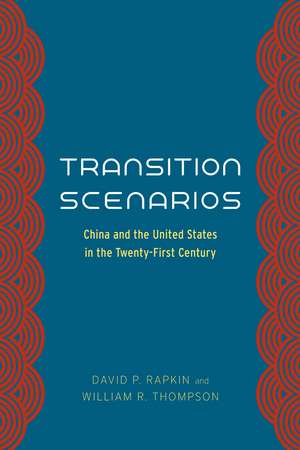Transition Scenarios: China and the United States in the Twenty-First Century
Autor David P. Rapkin, William R. Thompsonen Limba Engleză Paperback – 17 oct 2013
China’s rising status in the global economy alongside recent economic stagnation in Europe and the United States has led to considerable speculation that we are in the early stages of a transition in power relations. Commentators have tended to treat this transitional period as a novelty, but history is in fact replete with such systemic transitions—sometimes with perilous results. Can we predict the future by using the past? And, if so, what might history teach us?
With Transition Scenarios, David P. Rapkin and William R. Thompson identify some predictors for power transitions and take readers through possible scenarios for future relations between China and the United States. Each scenario is embedded within a particular theoretical framework, inviting readers to consider the assumptions underlying it. Despite recent interest in the topic, the probability and timing of a power transition—and the processes that might bring it about—remain woefully unclear. Rapkin and Thompson’s use of the theoretical tools of international relations to crucial transitions in history helps clarify the current situation and also sheds light on possible future scenarios.
Preț: 216.29 lei
Preț vechi: 258.01 lei
-16% Nou
Puncte Express: 324
Preț estimativ în valută:
41.39€ • 43.33$ • 34.24£
41.39€ • 43.33$ • 34.24£
Carte indisponibilă temporar
Doresc să fiu notificat când acest titlu va fi disponibil:
Se trimite...
Preluare comenzi: 021 569.72.76
Specificații
ISBN-13: 9780226040479
ISBN-10: 022604047X
Pagini: 288
Ilustrații: 4 line drawings, 21 tables
Dimensiuni: 152 x 229 x 23 mm
Greutate: 0.39 kg
Ediția:New.
Editura: University of Chicago Press
Colecția University of Chicago Press
ISBN-10: 022604047X
Pagini: 288
Ilustrații: 4 line drawings, 21 tables
Dimensiuni: 152 x 229 x 23 mm
Greutate: 0.39 kg
Ediția:New.
Editura: University of Chicago Press
Colecția University of Chicago Press
Notă biografică
David Rapkin is associate professor emeritus of political science at the University of Nebraska–Lincoln. He lives in Lincoln, NE. William R. Thompson is Distinguished Professor and the Donald A. Rogers Professor of Political Science at Indiana University. He lives in Bloomington, IN, and is the author or coauthor of numerous books, including The Arc of War, also published by the University of Chicago Press.
Cuprins
1. Twenty-First-Century Transition Struggles
2. Scenario Construction
3. Scenarios of Future United States–China Warfare: What Is Missing from This Picture?
4. Power-Transition, Offensive-Realism, and Leadership Long-Cycle Perspectives on Structural Transitions
5. Systemic Transition Dynamics and the Conflict Drivers in the China–United States Transition Context
6. Constraints on Transition Conflict
7. Weak Conflict Constraints and Weak Conflict Inducements: The “More of the Same” and “Pax Americana II” Scenarios
8. Weak Conflict Constraints and Strong Conflict Inducements: The “Transition War” Scenario
9. Strong Conflict Constraints and Strong Conflict Inducements: The “Pax Sinica” Scenario
10. Strong Conflict Constraints and Weak Conflict Inducements: The “Liberal Peace” Scenario
11. Using the Scenarios in the Twenty-First Century
Notes
Index
2. Scenario Construction
3. Scenarios of Future United States–China Warfare: What Is Missing from This Picture?
4. Power-Transition, Offensive-Realism, and Leadership Long-Cycle Perspectives on Structural Transitions
5. Systemic Transition Dynamics and the Conflict Drivers in the China–United States Transition Context
6. Constraints on Transition Conflict
7. Weak Conflict Constraints and Weak Conflict Inducements: The “More of the Same” and “Pax Americana II” Scenarios
8. Weak Conflict Constraints and Strong Conflict Inducements: The “Transition War” Scenario
9. Strong Conflict Constraints and Strong Conflict Inducements: The “Pax Sinica” Scenario
10. Strong Conflict Constraints and Weak Conflict Inducements: The “Liberal Peace” Scenario
11. Using the Scenarios in the Twenty-First Century
Notes
Index
Recenzii
“While there is no shortage of books concerned with US-China relations and the potential for conflict with China’s rise, Transition Scenarios is the first to systematically employ a scenario building or ‘forward reasoning’ methodology—and it does so carefully and to great effect, advancing a growing literature in the field of international relations.”
“Will there be a power transition between the United States and China later this century, and, if so, will it be violent or peaceful? David P. Rapkin and William R. Thompson provide a unique analytic framework for thinking about these questions by developing five alternative scenarios for the future based on theoretically guided investigations of the power transitions of the last five centuries. This analytically sophisticated and historically rich study is essential reading for all those interested in one of the most critical policy questions of our age.”
“Recommended. . . . Rapkin and Thompson put to use the international relations theory, power transition, to explore the dynamics of a Chinese challenge to the global leadership of the United States by the mid-21st century. . . . [The authors] present five scenarios [and] call for a ‘forward reasoning’ model to assist world leaders through this dangerous period. . . . This well-argued case belongs in college and university libraries with holdings in international relations.”
“China’s rising status in the global economy alongside recent United States’ ‘rebalancing Asia’ strategy has led to considerable speculations that the world is already in the early stage of a transition in power relations. Rapkin and Thompson make a great attempt to identify likely scenarios for power transition and the drivers behind the possible scenes in this century. . . . The authors do an excellent job in explaining their US–China transition scenario forecasts in comparison to the existing ones. By going deeper into the drivers of conflict-constraint/inducement, they have given us a clear idea on how the historical, cultural, economic, political, military, geographical, and environmental elements interact for paving a trajectory for the future transition.”
